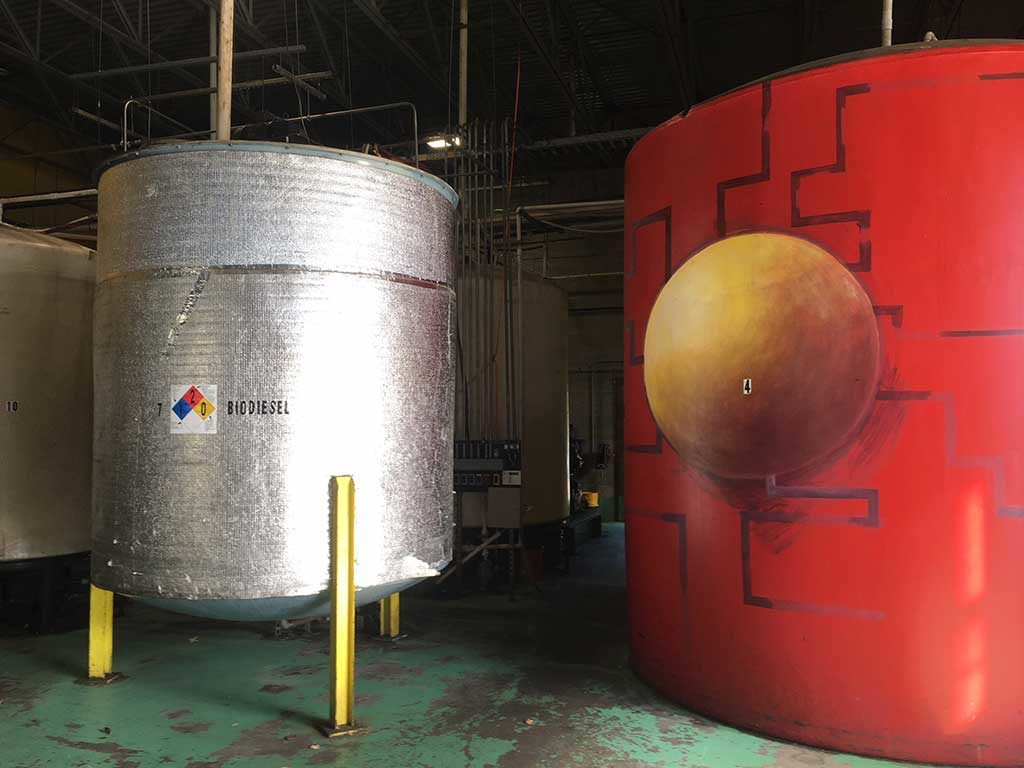Biofuel is Cleaner & More Local
By Tony Zeli & Cameron Autry

Maine Standard Biofuels turns recycled cooking oil into home heating fuel, but they collect far more vegetable oil than they can sell as biofuel. The excess is stored in tanks and sold to other biodiesel producers. -Photos by Tony Zeli
Mainers can expect sharp rises in the cost of home heating oil. Combined with the environmental cost of burning oil, no surprise many are ready for a change. But, converting heating systems is not a cheap fix for most. But a local business may offer an alternative: biofuel.
Biofuel is a mix of conventional home heating oil and recycled cooking oil. It is competitively priced with regular heating oil, and it will burn in your oil furnace without enhancements. The bonus? It burns cleaner and the recycled fuel is locally-sourced.
HEATING COSTS CLIMB
According to the Governor’s Energy Office, the average price for heating oil in October 2018 was $2.99. During the previous heating season the average price hovered around $2.59.
However, the price of heating oil varies greatly throughout Maine. In Southwest Maine, for example, the lowest reported price of heating oil in October 2018 was $2.65 per gallon, while the lowest price found in Northern Maine stood at $3.05 per gallon.
Also, heating oil prices can rise sharply in the Northeast during times of increased consumption, especially if demand exceeds the amount of oil in storage. Additional supplies of heating oil may have to be transported from Europe or the Gulf Coast, driving the cost even higher.
Furthermore, the Energy Information Association predicts that nationwide heating oil prices will spike to $3.27 a gallon. For Mainers, if we have an average winter, that means a 26 percent increase in the price of heating oil compared to last year. Meanwhile the average forecasted increase in heating oil prices nationwide is 20 percent.
Certainly, several compounding factors are contributing to the rise in heating oil prices.
The United States’ withdraw from the Iran nuclear agreement and reinstallation of economic sanctions, coupled with decreased production in Venezuela and Libya, have led to a significant increase in speculation within crude oil futures. Mounting tensions between Saudi Arabia and the United States are also to blame.
Moreover, crude oil prices are tied to the value of the US dollar, as oil contracts are generally denominated in dollars. This means the recent dip in the value of the dollar correlates with a rise in crude oil prices.
HEAT PUMPS
Of course, the price of crude oil is only one factor in determining home heating costs. The type and efficiency of heating systems are also factors. According to Efficiency Maine, the typical boiler heating system in Maine converts 75 percent of utilized fuel into heat, whereas newer systems can reach efficiency levels over 90 percent.
Also, despite the steep increase in heating oil prices, the Energy Information Association forecasts that homes heated by electricity will only experience a 3 percent increase in heating costs. As such, some Mainers are turning to heat pumps.
Heat pumps run on electricity and work through heat convection, moving hot air around. Heat pumps can convert 100% of energy consumed into heat, making them an effective and efficient heating alternative. But most homes with heat pumps use them for zone heating and still use oil furnaces or other central heating systems.
BIOFUELS
Meanwhile, a Portland business, Maine Standard Biofuels is bringing a new product to the home heating market. Known for picking up restaurants’ used cooking oil to burn in diesel engines, in the past couple of years Maine Standard Biofuels has developed a B20 home heating biofuel that they want to educate the public about.
“People are really starting to find out about us. And it’s sort of word of mouth. It’s really spreading,” says president and founder Jarmin Kaltsas. “So we’re getting more phone calls than ever… meeting more people in Portland. It’s a great community.”
The fuel is called B20 because it is a mix of 20 percent recycled cooking oil and 80 percent conventional ultra-low sulfur heating oil. Despite being only a 20 percent cut, Kaltsas claims his product can reduce your furnace’s CO2 output by 30%. In addition, it will burn in any oil furnace with no conversion and is competitively priced with regular heating oil.
“Your emissions across the board are reduced, your particulates… you know, everything is reduced. There really aren’t drawbacks,” says Maine Standard’s Jarmin Kaltsas.
Well, maybe there is one downside. B20 is still 80 percent fossil fuel. But in addition to being cleaner and more efficient to burn, the 20 percent recycled cooking oil part is locally-sourced.
Maine Standard collects used cooking oil from about 1500 different businesses around New England. This offers a regular, local supply of fuel that otherwise would go to waste. In fact, they collect a million gallons of used oil per year but can only use about half of it locally as biofuel. In other words, they could use more customers.
Biofuel – especially if coupled with simple insulation improvements such as window inserts – can be a part of an affordable and immediate plan to reduce a home’s heating oil demand and CO2 output.
RESOURCES
The Governor’s Energy Office provides an online calculator that residents can use to compare the costs and efficiencies of different heating systems. Visit https://www.maine.gov/energy/index.html.









One Comment
Austin Saunders
I like what you said about heat costs being determined by the cost of oil. My brother has been telling me about how he wants to make sure that his home is heated properly in the coming months. I’ll share this information with him so that he can look into his options for getting the right heating oil.